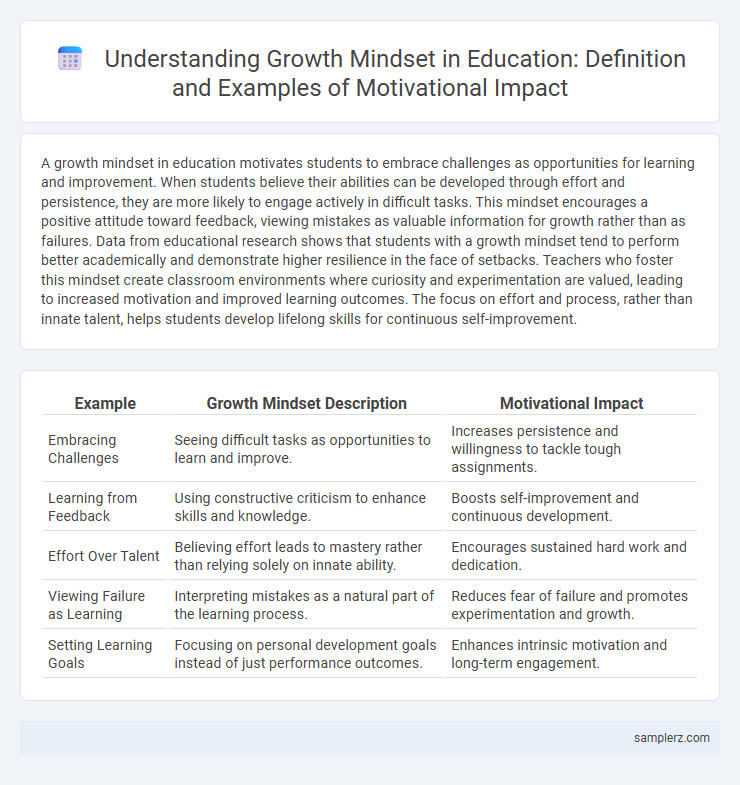A growth mindset in education motivates students to embrace challenges as opportunities for learning and improvement. When students believe their abilities can be developed through effort and persistence, they are more likely to engage actively in difficult tasks. This mindset encourages a positive attitude toward feedback, viewing mistakes as valuable information for growth rather than as failures. Data from educational research shows that students with a growth mindset tend to perform better academically and demonstrate higher resilience in the face of setbacks. Teachers who foster this mindset create classroom environments where curiosity and experimentation are valued, leading to increased motivation and improved learning outcomes. The focus on effort and process, rather than innate talent, helps students develop lifelong skills for continuous self-improvement.
Table of Comparison
| Example | Growth Mindset Description | Motivational Impact |
|---|---|---|
| Embracing Challenges | Seeing difficult tasks as opportunities to learn and improve. | Increases persistence and willingness to tackle tough assignments. |
| Learning from Feedback | Using constructive criticism to enhance skills and knowledge. | Boosts self-improvement and continuous development. |
| Effort Over Talent | Believing effort leads to mastery rather than relying solely on innate ability. | Encourages sustained hard work and dedication. |
| Viewing Failure as Learning | Interpreting mistakes as a natural part of the learning process. | Reduces fear of failure and promotes experimentation and growth. |
| Setting Learning Goals | Focusing on personal development goals instead of just performance outcomes. | Enhances intrinsic motivation and long-term engagement. |
Embracing Challenges: Student Stories of Perseverance
Students who embrace challenges demonstrate a growth mindset by viewing obstacles as opportunities for learning and development. One student shared how struggling with difficult math problems motivated them to develop new strategies instead of giving up. Stories of perseverance highlight that consistent effort and resilience lead to improved performance and deeper understanding in education.
Learning from Mistakes: Growth Mindset in Everyday Classroom Activities
Students exemplify a growth mindset by analyzing errors in assignments as opportunities for improvement, which enhances problem-solving skills and resilience. Teachers encourage reflection on mistakes during classroom discussions, fostering an environment where challenges are viewed as essential steps toward mastery. This approach increases motivation and persistence by shifting focus from avoiding failure to embracing continuous learning and development.
Turning Setbacks into Motivation: Real-Life Examples
Students who adopt a growth mindset view setbacks as opportunities for learning and persistence, leading to increased motivation and academic success. For example, a student who fails a math test may analyze their mistakes, seek help, and apply new study strategies, resulting in improved performance over time. This approach fosters resilience and a proactive attitude, essential traits for overcoming challenges in education.
Celebrating Effort: Motivational Strategies in Education
Celebrating effort in education fosters a growth mindset by recognizing students' persistence and hard work rather than innate ability, which motivates continuous improvement. Strategies such as providing specific, effort-based praise and showcasing progress through portfolios encourage students to embrace challenges and develop resilience. Schools implementing these practices report increased student engagement, higher academic achievement, and enhanced self-efficacy.
Resilience through Reflection: How Students Grow from Feedback
Students with a growth mindset view feedback as an opportunity to improve rather than a criticism, fostering resilience through reflection. They analyze mistakes, adapt strategies, and persist in the face of challenges, which enhances their motivation and learning outcomes. This reflective process strengthens their ability to bounce back and continuously develop academic skills.
The Power of Yet: Cultivating Optimism in Learners
Emphasizing "The Power of Yet" fosters a growth mindset by encouraging learners to view challenges as opportunities for development rather than fixed obstacles. This approach enhances motivation and resilience by reinforcing the belief that abilities and intelligence can improve with effort over time. Integrating this optimism into educational practices helps students persist through difficulties and achieve greater academic success.
Overcoming Failure: Growth Mindset Success Tales
Students embracing a growth mindset view failure as a stepping stone rather than a setback, fueling resilience and continuous effort. Thomas Edison's persistence in inventing the light bulb exemplifies this, as he famously regarded each failed attempt as valuable learning. This perspective motivates learners to analyze mistakes, adapt strategies, and persist until achieving success.
Inspiring Self-Motivation: Positive Language and Student Confidence
Using positive language such as "You can improve with effort" fosters student confidence and encourages resilience. Emphasizing progress over perfection shifts motivation from fear of failure to a desire for growth. This approach cultivates a growth mindset that inspires self-motivation and persistent focus on learning goals.
Collaborative Learning: Growth Mindset in Team Projects
In team projects, a growth mindset fosters collaborative learning by encouraging students to embrace challenges and view mistakes as opportunities for improvement. When learners believe their abilities can develop through effort and feedback, they actively seek input from peers and persist through difficulties. This positive attitude enhances motivation and strengthens problem-solving skills within the group dynamic.
Goal Setting and Achievement: Students Reaching New Heights
Students exhibit a growth mindset by setting challenging academic goals and persistently working towards them, viewing setbacks as opportunities for learning and improvement. This mindset fosters motivation, enabling students to develop effective study habits and resilience, which directly contribute to higher achievement levels. Research shows that students who embrace growth-oriented goal setting consistently reach new academic heights and demonstrate increased engagement in their learning.

example of growth mindset in motivation Infographic
 samplerz.com
samplerz.com